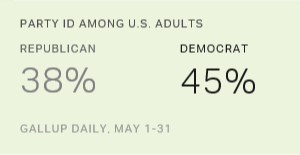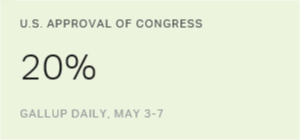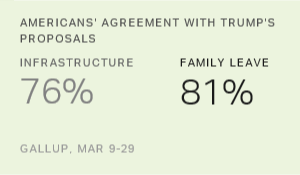President Donald Trump's new budget includes trillions of dollars in cuts to nondefense spending, affecting almost every department of the government. Gallup's latest update shows that 28% of Americans have a favorable opinion of the federal government, while 55% have an unfavorable opinion. That's the lowest rating for any business or industry sector we tested.
Given Americans' negative views of the federal government, it might seem logical to assume Americans would support cutting back government funding as Trump has proposed. But it's not that straightforward.
When we delve into it, we see that Americans are extraordinarily negative about one specific aspect of the federal government: their elected representatives in Congress. This echoes across a wide variety of measures, and the more Americans know about Congress, the more negative they are. The people just don't think the legislative system is working well. Americans think that Congress is corrupt and not focused on the interests of the people. They want their representatives to compromise rather than rigidly stick to principles.
Americans would clearly support efforts to reform or reinvent Congress and the way it works more than -- or as much as -- they might support big cuts in governmental departments and agencies.
And for the latter, our research has not found strong support for the idea of cutting back on government bureaucracies or employees on a wholesale basis. We have tested these types of proposals in a number of ways and have generally found less than majority support.
Further, there is strong evidence that Americans have mixed opinions on what the role of government should be in their lives. There is not a simple consensus that government and the services it provides should be cut back, regardless of consequences.
There is additional evidence that the people increasingly want their government to do more, not less.
A Gallup trend question poses this choice: "Some people think the government is trying to do too many things that should be left to individuals and businesses. Others think that government should do more to solve our country's problems. Which comes closer to your own view?"
Over the past 16 years, Americans have consistently been more likely to say the government does too much. In 2012, for example, 61% said the government is doing too much, while 34% said the government should do more. But our latest update in May found the gap down to two percentage points, with 47% saying it is doing too much and 45% saying it is not doing enough. This is the lowest gap since October 2001 after the 9/11 terrorist attacks and is one of the lowest across Gallup's entire trend since 1992.
The Wall Street Journal uses a slightly different question wording -- one that produces greater support for the government doing more: "I'm going to read you two statements about the role of government, and I'd like to know which one comes closer to your point of view: Government should do more to solve problems and help meet the needs of people, or government is doing too many things better left to businesses and individuals?"
In their most recent asking, the Journal found 57% of Americans saying the government should do more -- the highest percentage since they first asked the question in 1995.
The Journal question's inclusion of the words "help" and "needs of the people" most likely makes this alternative more attractive to respondents than does Gallup's wording of "do more to solve our nation's problems." But the key here is the finding that the public opinion trend in both wordings is toward the government doing more to solve problems and help meet the needs of the people.
All of this means it's likely that Americans are not going to look favorably on Congress blindly following Trump's budget proposals and simply taking a hatchet to government programs across the board without giving the whole process due diligence and deep thought.
This presents real challenges. There are not only the deep traditional divisions between Republicans and Democrats in Congress, but there are also fissures within the ranks of the Republicans themselves -- so entrenched that one former Republican Senate committee staff director called them "almost theological."
But the current budget situation, in theory, can actually provide an unusually positive opportunity for Congress to attempt to resurrect its image. If Congress can debate and discuss the budget in a rational and nonconfrontational way, it could help repair its tarnished and extraordinarily negative image. And, in the process, Congress could shed light on -- and provide informed insight into -- one of the most important and unresolved elements of American public opinion today: the appropriate role of government in Americans' daily lives.



